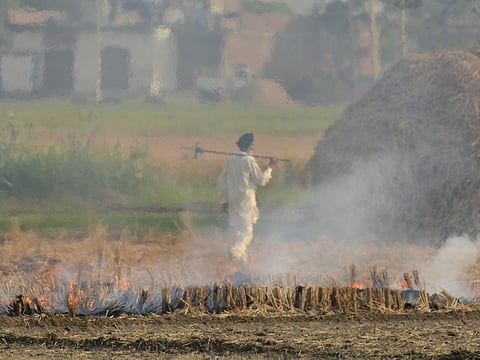Bihar blacklists 900 farmers over burning stubble leading to air pollution
Subsidies and incentives blocked for three years

Patna: The state government in Bihar has launched penal action against farmers caught burning stubble in their farms.
The move is aimed at protecting the environment from air pollution as a result of unchecked incidents of stubble burning.
Under part of this exercise, the National Democratic Alliance (NDA) government headed by chief minister Nitish Kumar in Bihar has blocked the subsidy and incentives of more than 900 farmers for the next three years.
These farmers will not get the benefits of subsidies and incentives for various things, such as for buying farm equipment, seeds and irrigation for three years. They will also be deprived of annual credit of Rs6,000 to their bank accounts under PM Kisan Yojana. Currently, more than 16.37 million farmers are registered with Bihar agriculture department to avail benefits of various government-sponsored schemes.
“The aim is to disincentivise the farmers to make them understand stubble burning is a wrong practice which not only causes air pollution but also affects soil fertility by destroying micro nutrients,” state agriculture secretary N Saravana Kumar told the media.
Keeping in view the seriousness of the situation, a team of state government officials headed by the agriculture secretary has been conducting aerial surveys of the state to assess the magnitude of stubble burning. In the past two days, the authorities found at least 11 districts indulging in this practice and held meetings with the local farmers to know the reasons behind it.
“There is severe crisis of farm labourers in Bihar as a result of which we have to use harvester machines. But in mechanised harvesting, the machines leave taller residues of crops which are very hard for us to remove from the ground. So, the farmers try to burn them as they have to soon use the land for wheat farming,” farmers told the officials in Nalanda district, which is one of the districts affected by stubble burning.
The agriculture scientists, meanwhile, have launched massive campaigns across the state to inform them about the perils of burning crop residues in the fields.
“We are telling the farmers to let the crop residues decay in the soil on their own rather than setting them afire. The mixing of crops residues in the soil not only increases its water retention capacity but also increase soil fertility,” prominent agriculture scientist R.K. Sohane associated with Bihar agriculture university said on Thursday.
He said the university was also distributing brochures and pamphlets among the farmer to educate them over the issue. This practice was not prevalent in Bihar till recently, being influenced by Punjab and Haryana.
Sign up for the Daily Briefing
Get the latest news and updates straight to your inbox






